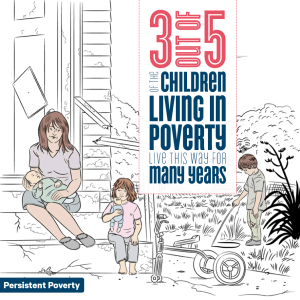The Support for Children in Hardship Bill is the legislation implementing the increases to welfare benefits announced in the Budget 2015. Public comments on this Bill are important way that politicians can hear directly the views of the public on the changes proposed. Changes proposed in this Bill are:
- raise work requirements for parents receiving a benefit, who must now seek when their youngest child turns 3 years of age (instead of 5 as at present) and require them to be available for part-time work of up to 20 hours per week (instead of 15 as at present).
- raise the maximum childcare subsidies payable by one dollar to $5 per hour.
- increase payments to parents receiving a benefit by $25 per week and low income parents in employment by $12.50 per week from 1 April 2016.
A Welcome & Historic Change in Policy
NZCCSS encourages as many people as possible to submit on the Bill and call for more to be done for children in poverty. The additional income to very low income families is a very welcome first step by government and will make a positive difference for families. It is important that all those submitting acknowledge this historic change in policy by the National-led government. The Government has finally and formally recognised that income is too low for families not in work and the most effective way to lift families out of hardship is to lift their incomes. The Government has taken the first steps towards overcoming the high levels of poverty that have existed over the past 25 years since the huge benefit cuts in 1991.
Unfortunately, this first step is too small to achieve its stated aim to lift children in the most hardship out of poverty. As Michael Fletcher of AUT has pointed out in his analysis of the package, a sole parent family with two children will still be around $77 per week below the lowest poverty threshold measured by MSD ($555 per week, 50% of median household income before housing costs, see Household Incomes in New Zealand, MSD 2014, Table E.2 p.123).
More Change Needed
Some issues that have been identified that could require changes to the Bill are:
- The poorest families will benefit least from the Bill because the payment is being made on a per-family and not per-child basis. This is a major flaw and means the stated aim of targeting the children in most hardship is missed. The children in greatest hardship are those living in households with two or more children (79%). Not surprisingly more than half of the children in most severe hardship are in families with three or more children.
- Bring forward the implementation date to 1 October 2015 (or even 1 July 2015, as the legislation can be made retrospective), so low income families get the support they need as soon as possible.
- Because of the way core benefits interact with other additional benefits like Temporary Additional Support (TAS) or the Accommodation Supplement (AS) many low income families will not receive the full $25 increase, but more like $17.50. It is important to ask the Select Committee to change the Bill so that it clearly ensures that the full increase of $25 goes go to low income families.
- Targeting that is missing the mark is once again a feature of this Bill. Excessive attempts at targeting assistance to the children perceived as most in hardship is creating even more complexity in an already confusing and complicated benefit system. As noted above, not only will this Bill make the system more complicated, the poorest families and their children benefit least from it.
- Work testing for parents of 3-year old children is quite likely to add to the stress of poverty for those families. The childcare subsidy increases and changing the part-time work availability requirement to 20 hours means people can access Working for Families credits (assuming they can find work for 20 hours a week) and offers some hope to lift incomes. But this is dependent on actual access to decent work at hours that match with school and quality childcare, as well as covering transport times and costs. The Government believes very young children in hardship benefit most from early childhood education – but there are many questions whether enough good quality childcare is really available in the communities where those children live.
Submissions are due on Wednesday 8th July. Go to the Parliament website to make a submission or post your comments to: Committee Secretariat, Social Services, Parliament Buildings, Private Bag 18041, Wellington 6160.

